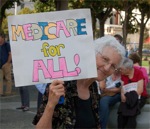The Health Care Fraud Prevention and Enforcement Action Team (HEAT) – a division of the Justice Department is at it again. Their goal…to stop Medicare fraud…! And, it looks like they are being effective.
Gevork Kartashyan and Eliza Shubaralyan, the owners and operators of a Los Angeles-area durable medical equipment (DME) company were sentenced to  prison in connection with an approximately $1 million power wheelchair fraud scheme. Each were sentenced to serve two years in prison and in addition, Kartashyan and Shubaralyan were ordered to serve three years of supervised release following their prison terms and to pay $400,000 in restitution, jointly and severally.
prison in connection with an approximately $1 million power wheelchair fraud scheme. Each were sentenced to serve two years in prison and in addition, Kartashyan and Shubaralyan were ordered to serve three years of supervised release following their prison terms and to pay $400,000 in restitution, jointly and severally.
Kartashyan and Shubaralyan, who are married, were convicted at a July 2009 trial in federal court in Los Angeles. Kartashyan was found guilty of conspiracy to commit health care fraud and health care fraud, and Shubaralyan was found guilty of health care fraud. At trial, the evidence showed that Kartashyan and Shubaralyan, through their company CHH Medical Supply, billed Medicare $949,859 and were paid $597,750 as a result of the billing. According to evidence presented at trial, virtually all the billing was for medically unnecessary power wheelchairs and wheelchair accessories.
At trial, elderly Medicare beneficiaries testified about how they were recruited into the scheme. According to testimony, the beneficiaries were taken to Los Angeles-area medical clinics, where they turned over their Medicare numbers and other personal identifying information. Some beneficiaries testified that they were promised vitamins, diabetic shoes and other items that they never received, in return for providing their beneficiary numbers. According to evidence presented at trial, these clinics were in the business of generating fraudulent power wheelchair prescriptions that could be sold to DME company owners, who then billed Medicare for the wheelchairs. Many of the beneficiaries did not know they were getting a power wheelchair until it was delivered by CHH Medical Supply. All of the beneficiaries testified that they did not need or use the power wheelchairs.
Five physicians testified at trial that they never authorized or approved the power wheelchair prescriptions written under their names. Three of these physicians testified that they never worked at the clinics listed on the phony prescription pads.
 According to testimony at trial, Kartashyan regularly purchased power wheelchair prescriptions. The evidence also showed that after the power wheelchairs were delivered, Kartashyan generated phony forms stating that the beneficiaries’ homes were appropriate for the use of a power wheelchair, even though no home assessment was conducted.
According to testimony at trial, Kartashyan regularly purchased power wheelchair prescriptions. The evidence also showed that after the power wheelchairs were delivered, Kartashyan generated phony forms stating that the beneficiaries’ homes were appropriate for the use of a power wheelchair, even though no home assessment was conducted.
Since their inception in March 2007, Strike Force operations in seven districts have obtained indictments of more than 500 individuals who collectively have falsely billed the Medicare program for more than $1 billion. In addition, HHS’s Centers for Medicare and Medicaid Services, working in conjunction with the HHS-OIG, are taking steps to increase accountability and decrease the presence of fraudulent providers.
ENOUGH SAID…any comments?
HEAT’S website can be found here.



 Posted by chuckgallagher
Posted by chuckgallagher 
 Here’s a question for you: If you had a service to provide — and someone asked you to provide it for free, or at a radically reduced price — would you do it?
Here’s a question for you: If you had a service to provide — and someone asked you to provide it for free, or at a radically reduced price — would you do it?


